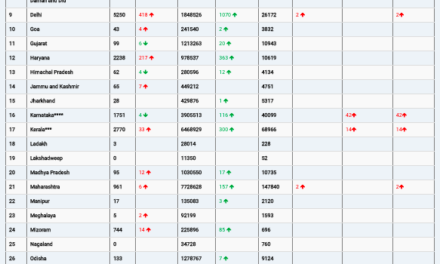The situation at a glance
On 11 May 2022, Germany notified WHO of one laboratory-confirmed human case of infection with a swine-origin influenza A(H1N1) virus in North Rhine-Westphalia, in the west of Germany. The case was detected during routine sentinel surveillance for influenza. No further cases have been reported in connection to this case and the patient has fully recovered. Although infections with A(H1N1) variant viruses occasionally occur, it is still considered a rare and unusual event.
Description of the case
On 11 May 2022, Germany notified WHO of one laboratory-confirmed human case of infection with a swine-origin influenza A(H1N1) virus in North Rhine-Westphalia state, Germany. The case is an adult aged 30-40 years, who was detected during routine sentinel surveillance for influenza. On 21 March, the case developed influenza-like illness symptoms including fever, cough, sore throat, headache and muscle pain. On 24 March, a nasal swab sample was collected, and on 29 March, influenza A virus was detected.
The sample was tested at the National Influenza Centre at the Robert Koch Institute in Germany. Influenza A virus was detected by reverse transcriptase-polymerase chain reaction (RT-PCR). On 5 May, whole genome sequencing pointed to a Eurasian avian-like swine A(H1N1) virus. Further virus characterization is underway.
The case was not hospitalized and has since recovered. Although the case had no direct contact with swine, the individual lived in a region with many swine farms and had contacts who were swine farmers.
Epidemiology of the disease
Influenza A(H1) viruses are enzootic in swine populations in most regions of the world. Human cases of infection with swine influenza viruses have sporadically been detected in several countries in Europe in recent years, of whom most had reported exposure to swine. Influenza A viruses in swine do not usually infect humans because influenza viruses that infect pigs may be different from human influenza viruses. Thus, influenza vaccines made against human influenza viruses are generally not expected to protect people from influenza viruses that normally circulate in pigs. When an influenza virus that normally circulates in swine is detected in a person, it is called a “variant influenza virus”. Sporadic human infections with variant viruses have been reported, usually after direct or indirect exposure to pigs or contaminated environments. Human infections with variant viruses tend to result in mild clinical illness, although some cases have been hospitalized with more severe disease and some have been fatal.
There have been several influenza A(H1) virus infections detected in Europe in recent years. Although infections with A(H1N1) variant virus occasionally occur, it is still considered a rare and unusual event.
Public health response
The German health authorities contacted family members of the case and offered serological tests to close contacts, including a circle of friends who are in the farming community. Authorities are also conducting retrospective epidemiological investigation. No other measures were implemented by the German authorities because the case has recovered and there is currently no evidence of ongoing transmission.
WHO risk assessment
Based on currently available information, this is a sporadic case and there is no evidence of disease spread so far. WHO assesses the risk to the general population posed by this virus to be low and the risk to occupationally exposed persons to be low-to-moderate. As the investigations are still being conducted by the national authority, the risk level will be amended accordingly if warranted.
Pigs are susceptible to avian, human and swine influenza viruses; they potentially may be infected with influenza viruses from different species at the same time. If this happens, it is possible for the genes of these viruses to mix and create a new virus. This type of major change in the influenza A viruses is known as antigenic shift. If this new virus causes illness in people and can be transmitted easily from person-to-person with no population immunity, an influenza pandemic may occur.
Should individuals infected with a variant influenza virus travel internationally, their infection may be detected in another country during travel or after arrival. If this were to occur, further community level spread is considered unlikely as this virus has not acquired the ability to transmit easily among humans.
WHO advice
Surveillance:
- This case does not change the current WHO recommendations on public health measures and surveillance of seasonal influenza.
- WHO does not advise special traveler screening at points of entry or restrictions with regard to the current situation of influenza viruses at the human-animal interface.
- Due to the constantly evolving nature of influenza viruses, WHO continues to stress the importance of global surveillance to detect virological, epidemiological and clinical changes associated with circulating influenza viruses that may affect human (or animal) health and timely virus sharing for risk assessment.
Notification and investigation:
- All human infections caused by a novel influenza subtype are notifiable under the International Health Regulations (IHR) and State Parties to the IHR (2005) are required to immediately notify WHO of any laboratory-confirmed case of a recent human infection caused by an influenza A virus with the potential to cause a pandemic. Evidence of illness is not required.
- In the case of a confirmed or suspected human infection caused by a novel influenza virus with pandemic potential, including a variant virus, a thorough epidemiologic investigation of history of exposure to animals, of travel, and contact tracing should be conducted. The epidemiologic investigation should include early identification of unusual respiratory events that could signal person-to-person transmission of the novel virus. Clinical samples collected from the time and place that the case occurred should be tested and sent to a WHO Collaboration Center for further characterization.
Travel and trade:
- WHO does not recommend any restriction on travel and/or trade for Germany based on the currently available information.
Prevention measures for travelers:
- Travelers to countries with known outbreaks of animal influenza should avoid farms, contact with animals in live animal markets, entering areas where animals may be slaughtered, or contact with any surfaces that appear to be contaminated with animal feces. Travelers should also wash their hands often with soap and water. Travelers should follow good food safety and good food hygiene practices.











